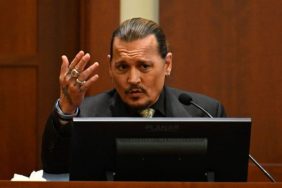Photo: Beowulf Sheehan.

Welcome to Carousel Court, Joe McGinniss Jr.’s new novel about the American dream turned night terror, a place where desperation is as palpable as the brutal California heat, incessant cicadas, and blood-hungry coyotes. The book comes eight years after the author’s gritty debut, The Delivery Man, that took readers into the greed and grime of Las Vegas’ prostitution scene. That book is currently being made into a feature film.
McGinniss Jr. spoke to Crave from Washington D.C., where he lives with his wife and son.
Crave: Your father, Joe McGinniss, was a writer. How did that influence you and your path?
Joe McGinniss Jr.: I grew up with my mom and my sisters. They divorced when I was born. He, at 26, was a self-started reporter and then columnist and didn’t come from a writing family at all and then wrote this great, wonderful book about the use of TV in politics called The Selling of the President. By 27, it was a bestseller. His career just launched and off he went into the world of writing and publishing back when it was really glamorous.
To us, it didn’t mean anything other than, “Dad is doing this. Dad is doing that.” He was always in touch. We’d spend the weekends. We had a decent relationship throughout life, but he went through the wringer, professionally. He crashed and burned multiple times. Every writer is his own mini-corporation. It was always “He’s got to slay the world.” And that took its toll. Jesus. It wasn’t pretty.
It took a while to really appreciate what he was doing and how hard it was. I didn’t write for a long time. I was into politics and basketball and not writing, and Lord, once I started, I thought, “Oh, this is so easy.” Then I got feedback and I’m like, “I guess what I’ve written is pretty much shit. So maybe it’s not so easy.”
Carousel Court takes place in Los Angeles. Tell me about your relationship with that city.
I’m in love with that city. It’s mesmerizing. It’s beautiful. I proposed to my wife in Hermosa Beach, so it has a special place in my heart. She was out there working and I was back in D.C., floundering, trying to write. I had to pull the trigger at some point, so I flew out there with a ring, my laptop, and what I thought was a novel, and somehow convinced her to say yes, she’d marry me. That was on the deck of this little, crappy apartment on The Strand. It sort of cast a spell on me, not having grown up there. It’s such an inspiring place for all sorts of reasons.
The combination of everything came together with the collapse of the housing market. Of course I was following the news, like a lot of people, and I zeroed in on Southern California and the Inland Empire and “foreclosure alley.”
The way that you write the landscape in Carousel Court is very sinister, so it’s interesting to hear you say how beautiful it is.
Obviously, L.A. is beautiful in so many ways, but for this story, it felt right to me to focus on the elements that really drove the theme. I wasn’t trying to be too high-minded about it, but it didn’t seem appropriate to spend too much time writing about idyllic sunsets, volleyball players, eating good stuff, running on The Strand, and the palm trees. I mean, okay, that could be great for another story, but for this, what I saw going out there and talking to people who lived in Lake Elsinore and all throughout the Inland Empire was: yeah, you see some great landscapes, but Lord, there’s always a fire bearing down or the threat of one, there always seems to be some sort of wildlife disaster, you’ve got to watch your back for this element or that element, and the floods and the rainy season. Mike Davis, who’s written a bunch of books about L.A., wrote the Ecology of Fear all about Southern California and the elements of disaster that exist out there, whether they’re natural or man-made. So, you know, I suppose I could have written about Disneyland…
That’s sort of dark in its own way.
There you go. I’m just not smart enough or creative enough. You’re right. Disneyland could be horrifying. It is horrifying.
When you’re writing these serious, high-tension books, how do you prevent yourself from being consumed by that dark energy? How do you counteract it?
My son. I’m pretty much addicted to this whole father thing. That’s one wonderful thing about connecting with the right partner: it allows me to write, at this point full-time, which then allows me to take him to school and pick him up after school and watch him play and coach his basketball team and talk about everything under the sun and try to listen to most of everything that he says. It’s just amazing. There’s no trouble breaking from that. It was harder with the first book to shake out of the darkness because he didn’t exist and there was so much uncertainty around whether or not what I was working on would become a novel and ever get published, so that had more of a stranglehold on me in terms of “Holy crap.” It wasn’t just “This is dark stuff. Can I turn off the laptop and see the sun?” but it was like “What do I do if this fails? If I can’t make it as a writer, I’m going to be miserable.” I still feel that way, but I’m a little bit more grounded with the family stuff. And I play basketball. That keeps the endorphins going.
Text messaging can be a hard thing to pull off in a narrative, but it seems very natural in your book. Was it a challenge to write that in?
Oh, thank you. No, it really wasn’t a challenge. It just felt like an extension of dialogue. It is a form of dialogue. It’s something I used to scoff at, thinking I was like a 14-year-old if I’m texting. But then I got a smart phone and started texting. It’s really easy to have conversations without talking. So I just kind of channeled that.
Your main character, Nick, has a job clearing out abandoned homes. Is that an actual job? Have you met people who do that?
Yes, it was quite a booming industry. There was a company in Lake Elsinore that specialized in, or had kicked open a specialty branch of their company for, trashing out houses. The banks would hire them to go out and clear out the houses that were abandoned. There was a great story by SoCal Connected, a news firm, about the scene out there. I reached out to this kid who was profiled in the news report. It was really interesting to hear his stories and his perspective on how much work there was and the psychological toll it took to go through these people’s belongings. You had the fear of going in, ‘cause you don’t know what you’re going to encounter, and then, once you realize, “Okay, I’m not going to get jumped or find a dead body,” now you’re going through some little girl’s journal or her pictures or her stuffed animals. What kind of family just goes and leaves all this stuff? How horrible do things have to be? It was really interesting to hear this kid talk. Then a couple of homeowners who were underwater were very courageous and talked to me. It was really moving.
Almost ten years passed between the publication of your two books. Why did it take that long?
It’s because I had a kid! Julien was born in 2007 and I was a stay-at-home dad for a couple years, which was amazing and exhausting. I just didn’t have that thing, that “Now! Go! Write the next novel!” I was like, “Now! Go! Figure out how I’m going to get twenty minutes to do something before he’s awake!” It was all-consuming. At the time, The Delivery Man was optioned as a feature film and I was caught up in who was going to write the script. So I got distracted as well. It was much easier to do the lazier stuff of following film rights than creating.
And also, I did spend a year writing a different story, with some wonderful feedback from my agent who was also an editor. She read it and she was like, “I think this part is working really well, but I don’t know if you want to follow this thread, because I feel like it might get you pigeon-holed.” It was more in the vein of The Delivery Man but with an older couple. I felt a little skittish about it and she confirmed that, and then I was like, “Let me rethink this.” And then the collapse happened. In terms of the housing, there was so much going on, I thought, “I’ve got to tap into that.” So it was good. It was wonderful to get that redirection.
Will your next book come quicker down the pipeline now that your son is older?
Yes. Absolutely. I’m well into the note phase. Notes take various forms in terms of writing scenes and character research, but I’ve got what I hope is a compelling little story.








